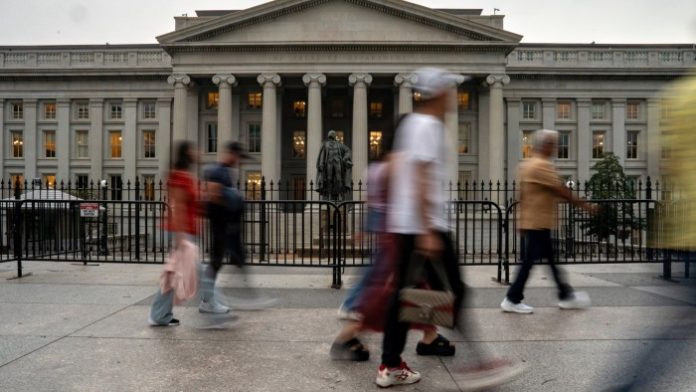Donald Trump’s ongoing feud with Jay Powell is likely to have a lasting impact on the $29tn Treasury market, even though the US president has backtracked from his apparent threat to fire the Federal Reserve chair, according to major investors.
This week, Trump stated that he had “no intention” of firing Powell but reiterated his dissatisfaction with the Fed’s slow pace of cutting borrowing costs. This episode has raised concerns among investors about Fed independence and the direction of US monetary policy, with Powell’s term as chair set to conclude in May 2026.
“Once those words are spoken, they linger in people’s minds, creating anticipation for what the next surprise might be,” noted Andrew Chorlton, chief investment officer for fixed income at M&G Investments. “If confidence in the Fed’s independence is eroding, investors expect to pay a higher price for it.”
Concerns about central bank independence have intensified as the president has been ramping up calls for lower rates in recent weeks, expressing that the end of Powell’s term “cannot come fast enough.” This has led to a sell-off in Treasuries, pushing the 10-year Treasury yield above 4.4 percent this week, approaching levels seen during the market turbulence earlier this month.
Large Treasuries investors note a persistent concern in the market regarding the Fed’s independence, particularly the possibility of an unorthodox selection for the chair’s replacement, resulting in a “risk premium” in Treasury yields that is keeping them elevated. Even with a slight recovery, 10-year yields hovered around 4.34 percent on Thursday.
This “risk premium” associated with Treasuries due to perceived higher risk compared to secure German Bunds stands at approximately 1.9 percentage points, up from less than 1.3 percentage points earlier this month.
Debates over Fed independence have added to existing worries that have impacted Treasuries prices recently, including concerns over government borrowing and repercussions from Trump’s trade conflicts, as investors question the US bond market’s traditional safe haven status.
William Campbell from DoubleLine Capital warns that governmental interference in the central bank risks undermining a key pillar of investor confidence, drawing parallels to crises seen in emerging markets such as Turkey’s unconventional monetary policies in recent years.
“The discussion of Powell’s removal only heightens the market’s demand for additional risk premium,” Campbell explains. “It can lead to a situation similar to what happened in Turkey.”
Tobias Adrian, the IMF’s markets chief, stressed the importance of central bank independence in maintaining stability. Although he refrained from commenting directly on Trump’s recent statements about Powell, Adrian emphasized that independence fosters stability and undermining it would introduce uncertainty.
The risk premium associated with Treasuries is typically minimal due to its deep liquidity and global reserve asset status. Nevertheless, policy volatility, including pressure on the central bank, is exerting downward pressure on US asset prices across financial markets, according to Robert Tipp, head of global bonds at PGIM Fixed Income.
“We’ve observed it in currency fluctuations, bond price differentials, and stock market variations. It is exacting a toll,” Tipp adds.
Investors are worried about the possibility of Trump influencing US monetary policy towards a softer stance on inflation to achieve lower interest rates, particularly if a more accommodating attitude towards inflation is detected by the market. Long-term bonds could suffer significantly if such a shift in policy sentiment occurs.
Despite Trump’s retreat from his threats against Powell, analysts suggest that the president could still impede Fed independence. There is speculation that he might nominate a successor early, effectively creating a “shadow chair” who shapes monetary policy expectations while Powell continues in his role, according to Matthew Raskin, US head of rates research at Deutsche Bank.
With speculation already arising among rates analysts and investors about potential candidates, Kevin Warsh, a former Fed board member and previous contender for Treasury secretary, is seen as a likely replacement. Warsh, who strongly criticized Fed policies last year, may need to adjust his more traditional Republican views and align with Trump’s stance on low interest rates if he desires the job, noted Capital Economics in a statement prior to Trump’s reversal. Another potential candidate named is Kevin Hassett, director of the National Economic Council under Trump.
According to DoubleLine’s Campbell, selecting the next Fed chair is fraught with risks, particularly as global investors begin to question the foundational principles of their investments. Investment managers caution that signaling an unorthodox replacement or preparing for a shift in Fed policy could trigger further declines in bond prices compared to other markets.
“Given the current environment, the possibility of such a scenario is certainly real, and it’s challenging for someone to stand in the way of that locomotive if it appears to be advancing,” Tipp from PGIM adds. “We are vulnerable to that risk.”
Additional reporting by Claire Jones in Washington




